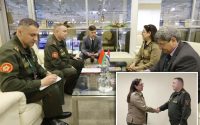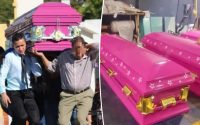Salman Rushdie breaks silence after attack: I have PTSD, nightmares
Author Salman Rushdie spoke out for the first time since being brutally stabbed last summer at a literary event in western New York, saying he suffers post-traumatic stress from the “colossal” attack that left him partially blind.
“There is such a thing as PTSD, you know,” he told the New Yorker in his first interview since he was stabbed 15 times by a lone-wolf Islamic fanatic, who copped to the attempted assassination last summer in a jailhouse interview with The Post.
“I’ve found it very, very difficult to write. I sit down to write, and nothing happens. I write, but it’s a combination of blankness and junk, stuff that I write and that I delete the next day. I’m not out of that forest yet, really.”
The heinous attack on Rushdie, 75, came after the author of “The Satanic Verses” had gone into hiding for a decade over Iranian supreme leader Ayatollah Ruhollah Khomeini issuing a fatwa calling for his death in 1989 and labeling the book blasphemous.
A so-called Iranian charity organization has a longstanding multimillion-dollar bounty on the author’s head, and other writers, translators and publishers associated with Rushdie’s novel have been killed or injured in connection with the novel, according to US officials.

Rushdie, an Indian native, was reportedly hospitalized for six weeks following the attack at the Chautauqua Institution in Chautauqua, NY. He had stayed at his New York City home since being released, leaving only for frequent doctor’s visits.
The author of 21 books — who had reportedly lost sight in his right eye — wore glasses with a blacked-out right lens when he met a reporter at his literary agent’s Manhattan office last month.
Rushdie had also lost more than 40 pounds since the stabbing and suffered nerve damage in his left hand. He spoke fluently but with a drooping lip, and had visible scar tissue on the right sight of his face, according to the piece, which was published Monday.

“Well, you know, I’ve been better,” he told the magazine when asked about his spirits.
“But, considering what happened, I’m not so bad. As you can see, the big injuries are healed, essentially. I have feeling in my thumb and index finger and in the bottom half of the palm. I’m doing a lot of hand therapy, and I’m told that I’m doing very well.”
“I’ve always tried very hard not to adopt the role of a victim,” he said. “Then you’re just sitting there saying, ‘Somebody stuck a knife in me! Poor me.’ … Which I do sometimes think,” he said through laughter.

Rushdie told the outlet he could no longer type “very well” because of a “lack of feeling in the fingertips,” and added that sleeping was also a struggle.
“There have been nightmares — not exactly the incident, but just frightening. Those seem to be diminishing. I’m fine. I’m able to get up and walk around,” he reportedly said. “When I say I’m fine, I mean, there’s bits of my body that need constant checkups. It was a colossal attack.”
Rushdie had been defiantly living a public life without security in Manhattan in recent years despite the fatwa and bounty still on his head in connection with “Verses,” which was banned and panned by some fundamentalists over its supposed insulting depictions of Islam.
He spoke to the magazine about being criticized for not living in fear in recent years as well as the outpouring of support he received after the attack.
“People didn’t like it. Because I should have died. Now that I’ve almost died, everybody loves me. … That was my mistake, back then. Not only did I live but I tried to live well. Bad mistake. Get 15 stab wounds, much better,” he said.
Rushdie appeared to be happy to be back in his agent’s office, and looked forward to celebrating the release of his new book, “Victory City,” due to be published Tuesday by National Geographic Books.

“Victory” is billed as an “epic tale of a woman who breathes a fantastical empire into existence, only to be consumed by it over the centuries,” by the publisher.
“It’s great to be back,” he reportedly said. “It’s someplace which is not a hospital, which is mostly where I’ve been to. And to be in this agency is — I’ve been coming here for decades, and it’s a very familiar space to me. And to be able to come here to talk about literature, talk about books, to talk about this novel, ‘Victory City,’ to be able to talk about the thing that most matters to me.”
Admitted attacker Hadi Matar, 24, of Fairview, NJ, told The Post in August he had only read “two pages” of “The Satanic Verses” but had “respect” for the ayatollah.
“I think he’s a great person. That’s as far as I will say about that,” Matar said from the Chautauqua County Jail, adding that he was “surprised” Rushdie had survived the brutal assault.

Matar, who faces more than 30 years in prison, said he went to Chautauqua after learning of Rushdie’s appearance at the literary event.
“I don’t like the person. I don’t think he’s a very good person,” he said about Rushdie. “I don’t like him. I don’t like him very much.”
When asked by the New Yorker who was to blame for his attack, Rushdie was succinct.
“I blame him,” he said, referring to Matar.
The author had nothing but praise for the doctors, EMTs and firemen who responded to his medical emergency, and for his wife, Rachel Eliza Griffiths, and two grown sons.
“I’m lucky. What I really want to say is that my main overwhelming feeling is gratitude,” he said.
“At some point, I’d like to go back up there and say thank you.”


